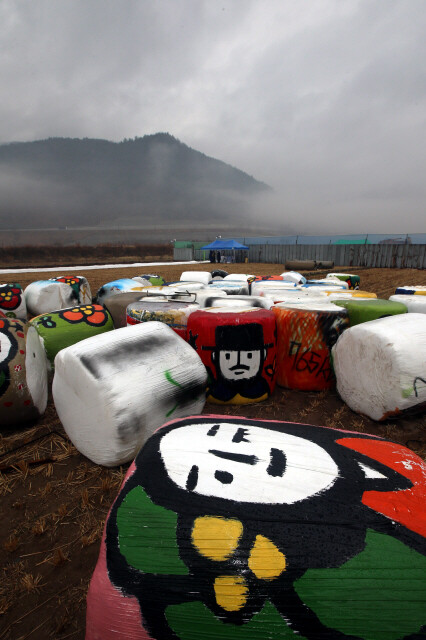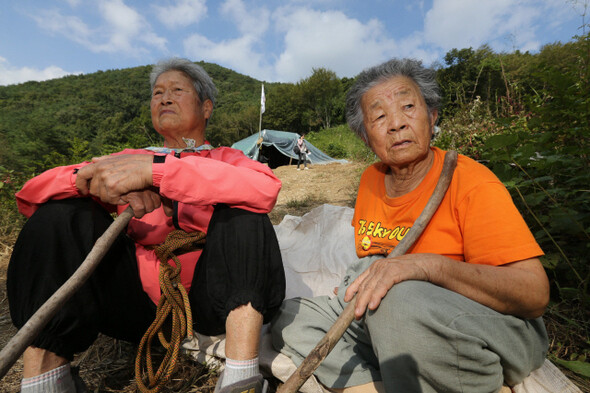hankyoreh
Links to other country sites 다른 나라 사이트 링크
Bora residents grudgingly give up long fight against electricity towers

By Lee Jae-uk, staff reporter
Bora Village is a cozy community. It is located in the Sanoe township of Miryang, South Gyeongsang Province, nestled in the smooth foothills of Mt. Seunghak. Indeed, the name “Bora” translates into something similar to “rocks that embrace like silk.”
For some time now, Bora has been the “face of Miryang” in South Korea. It moved to the forefront of the campaign against the construction of electricity transmission towers in the city following the death of one of its residents, 74-year-old Lee Chi-woo. In January 2012, Lee set fire on himself at the village entrance, declaring that he could “not bear living to see those pylons standing here.”
His death rallied residents against the project. Village elders turned into warriors in the street. Last October marked the height of the opposition campaign, with residents deciding the forgo farming for a year to preserve the village. They went without sleep to take turns keeping night watch over the sites where heaps of construction materials were kept.
It was last January when the village winds shifted. The long and wearying eight-year campaign was showing no signs of ending, and no real hope of success. One resident after another signed an agreement with the Korea Electric Power Corporation (KEPCO), coaxed along by neighbors who had already signed on. By Feb. 7, most of the households were on board. Opposition campaign leader Lee Jong-suk, 71, had to step down as village head despite having time left in his term. The residents who had agreed to the construction refused to recognize him.
Like the foothills in their community, the residents had traditionally been the warm and embracing type. When a Hankyoreh reporter visited the village in Oct. 2013 to cover the story, they brought lunchboxes in case he was hungry, and the local community center, a space for residents, was made available for accommodations. The reporter was even named an “honorary resident” of Bora.
Ever since a majority of residents agreed to the construction last month, however, the village has been keeping quiet. Residents do not pick up when called; those who do insist they “know nothing” about the agreement. The last holdouts, nine families that had refused to agree with KEPCO, finally did so on Mar. 14.
With that, the 90 people and 39 households of Bora had all officially signed on.
For these ordinary people, KEPCO has been an insurmountable barrier. The residents, most of them in their 70s and 80s, simply grew exhausted from a battle against impossible odds. Meanwhile, offers of compensation from KEPCO further wore down their defenses.
“I had a sense of pride in being a Bora villager,” said 72-year-old Kim Eung-rok. “After Lee Chi-woo died, I decided I was also willing to burn myself fighting, but the reality was just too tough.”
“The construction just kept going even after we said we would commit suicide,” Kim added. “We felt powerless.”
Lee Sang-woo, the 74-year-old younger brother of Lee Chi-woo, said only that he was “exhausted.”
“I‘m not fit to look at my brother,” he added before hanging up.
Another resident, who declined to give a name, said the compensation was not the main deciding factor.
“It was just over 5 million won (US$4,670), which isn’t much compared to the massive property damages the transmission towers are going to cause,” the resident said. “It was more the shame about people saying we were ‘only doing it to get more money,’ and the lack of interest from people.”
Others said that having neighbors who had once been like family turning their backs on one another became too much to bear.
“A chill descended on the village as residents fought with each other,” said Lee Jong-suk. “I reached an agreement with KEPCO because I just couldn’t take it anymore.”
“I’m sorry,” he added.
Once divided over the construction, the village appears, at least outwardly, to be united once again. Having reached compensation agreements with every household, KEPCO has begun its construction work. If the plan holds, the tower will be up in Bora by May. From the residents, there were only shamefaced words of apology.

Please direct questions or comments to [english@hani.co.kr]

Editorial・opinion
![[Editorial] Penalties for airing allegations against Korea’s first lady endanger free press [Editorial] Penalties for airing allegations against Korea’s first lady endanger free press](https://flexible.img.hani.co.kr/flexible/normal/500/300/imgdb/original/2024/0502/1817146398095106.jpg) [Editorial] Penalties for airing allegations against Korea’s first lady endanger free press
[Editorial] Penalties for airing allegations against Korea’s first lady endanger free press![[Editorial] Yoon must halt procurement of SM-3 interceptor missiles [Editorial] Yoon must halt procurement of SM-3 interceptor missiles](https://flexible.img.hani.co.kr/flexible/normal/500/300/imgdb/child/2024/0501/17145495551605_1717145495195344.jpg) [Editorial] Yoon must halt procurement of SM-3 interceptor missiles
[Editorial] Yoon must halt procurement of SM-3 interceptor missiles- [Guest essay] Maybe Korea’s rapid population decline is an opportunity, not a crisis
- [Column] Can Yoon steer diplomacy with Russia, China back on track?
- [Column] Season 2 of special prosecutor probe may be coming to Korea soon
- [Column] Park Geun-hye déjà vu in Yoon Suk-yeol
- [Editorial] New weight of N. Korea’s nuclear threats makes dialogue all the more urgent
- [Guest essay] The real reason Korea’s new right wants to dub Rhee a founding father
- [Column] ‘Choson’: Is it time we start referring to N. Korea in its own terms?
- [Editorial] Japan’s rewriting of history with Korea has gone too far
Most viewed articles
- 160% of young Koreans see no need to have kids after marriage
- 2Presidential office warns of veto in response to opposition passing special counsel probe act
- 3Hybe-Ador dispute shines light on pervasive issues behind K-pop’s tidy facade
- 4Months and months of overdue wages are pushing migrant workers in Korea into debt
- 5[Editorial] Penalties for airing allegations against Korea’s first lady endanger free press
- 6Japan says it’s not pressuring Naver to sell Line, but Korean insiders say otherwise
- 7OECD upgrades Korea’s growth forecast from 2.2% to 2.6%
- 8Bills for Itaewon crush inquiry, special counsel probe into Marine’s death pass National Assembly
- 9[Guest essay] Maybe Korea’s rapid population decline is an opportunity, not a crisis
- 10[Reporter’s notebook] In Min’s world, she’s the artist — and NewJeans is her art